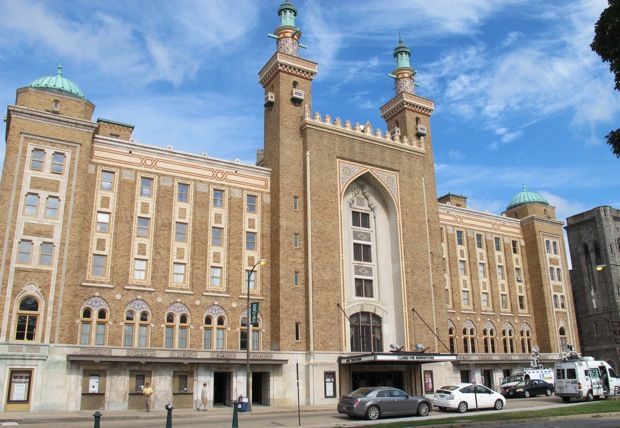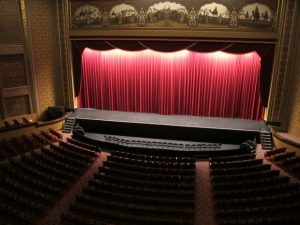
Altria is putting $10 million toward the renovation of the 85-year-old theater. (Photos by David Larter)
The next time someone tells you to stop smoking, you can tell them you’re supporting the arts.
Richmond Mayor Dwight Jones announced Thursday that the Landmark Theater will be renamed the Altria Theater. Altria scored the naming rights by forking over $10 million over five years to help fund the 85-year-old theater’s $50 million renovation.
Altria CEO Martin Barrington said at a news conference Thursday at the theater on Laurel and Main streets that the donation “represents a great collaboration between the public and private sectors.”
“The renovation of this theater, the Altria Theater, will be a real catalyst for economic growth,” Barrington said.
In addition to the $10 million from Altria, the renovation will be funded with $14 million from the city, anticipated private donations and with the help of historic tax credits.
Jones said at the news conference that he wanted to show people how “a $14 million investment could turn into a $50 million investment through budgetary magic.”
Richmond’s chief administrative officer, Byron Marshall, told BizSense that the budgetary magic was made possible in part by the roughly $62 million infusion of cash the city received from Richmond Metropolitan Authority this year.
The RMA money was used to restructure the city’s debt. That allowed the city to donate $14 million to the Altria Theater without raising taxes, Marshall said.
In 2009, the city spent $2.5 million to install a bigger loading dock at the Landmark to attract large Broadway productions. After the box-office success of “The Lion King” and “Wicked” — and the resulting bump in revenue — the city pulled the trigger on the renovation plan.
This isn’t the first time the city has gone into the theater renovations business. In 2009, the city donated $600,000 to the renovation of Jackson Ward’s Hippodrome Theater. It put $25 million toward the renovation of the Carpenter Theatre.
About 35 percent of the Landmark’s $50 million makeover will be repaid with the help of the historic tax credit system, which is used by developers to offset the hard costs of renovating historic buildings. Between state and federal programs, developers can receive up to 45 percent of their qualified costs in tax credits, which are then sold to companies that use them to ease their corporate tax burden.
The city estimates — based on the current market — that it could get at least $17 million back from the sale of potential tax credits, Marshall said.
“The market right now is something more like 90 cents on the dollar for tax credits, but we set the mark at 80 cents, which is a conservative estimate,” he said. “It could be $17 million, could be $18 million or more.”
But the city will not be the ones selling the tax credits. That job falls to the Richmond Performing Arts Center Inc., a wholly owned for-profit subsidiary of the CenterStage Foundation, which runs the Carpenter Theatre near City Hall and is chaired by Dominion chief executive Tom Farrell. The city owns Altria Theater, but the CenterStage Foundation operates it.
In addition to selling the tax credits once the renovation is complete, RPAC will oversee the project, as it did for the Carpenter Theatre renovation downtown. The fundraising will be done by the CenterStage Foundation.
RPAC hired the Rhode Island-based firm Gilbane to be the general contractor. The architect on the project is the Massachusetts-based Wilson Butler Architects.
Tammy Hawley, Mayor Jones’s press secretary, said that no taxpayer money beyond the $14 million contribution would be used on the Altria Theater renovations, meaning that any cost overruns would be on RPAC and CenterStage.
CenterStage Executive Director Richard Parison said he didn’t expect that to happen.
“The Carpenter Theatre came in on time and under budget,” Parison said. “RPAC is an excellent steward of all the expenses and the money.”
CenterStage sees Altria’s $10 million donation as the first big donation in its Landmark and Legacies Capital and Endowment Campaign, Parison said.
CenterStage will need to raise an additional $8 million to cover the construction costs beyond the city’s $14 million, Altria’s $10 million and the $18 million it plans to eventually get in tax credits.
CenterStage also hopes to raise an additional $10 million as an endowment for the theater.
“In the best of all possible worlds, [that] would leave us about $500,000 a year for operating costs in addition to our annual capital campaign,” Parison said.
In the meantime, SunTrust Bank is the lender on the construction loan, he said.
Parison, who serves of the board of RPAC, said the construction would be done in five phases over three years. The theater will reopen throughout the renovations for performances so as not to lose three years of income.
The first repairs will be to the theater’s fire systems and to the brickwork on the facade.
As for the sale of tax credits, Parison said that RPAC was still in negotiations over the details and that he couldn’t comment on a potential buyer or buyers.
“The tax credits are a big part of the financing,” he said. “But private donations and contributions will make up almost as large a portion.”

Altria is putting $10 million toward the renovation of the 85-year-old theater. (Photos by David Larter)
The next time someone tells you to stop smoking, you can tell them you’re supporting the arts.
Richmond Mayor Dwight Jones announced Thursday that the Landmark Theater will be renamed the Altria Theater. Altria scored the naming rights by forking over $10 million over five years to help fund the 85-year-old theater’s $50 million renovation.
Altria CEO Martin Barrington said at a news conference Thursday at the theater on Laurel and Main streets that the donation “represents a great collaboration between the public and private sectors.”
“The renovation of this theater, the Altria Theater, will be a real catalyst for economic growth,” Barrington said.
In addition to the $10 million from Altria, the renovation will be funded with $14 million from the city, anticipated private donations and with the help of historic tax credits.
Jones said at the news conference that he wanted to show people how “a $14 million investment could turn into a $50 million investment through budgetary magic.”
Richmond’s chief administrative officer, Byron Marshall, told BizSense that the budgetary magic was made possible in part by the roughly $62 million infusion of cash the city received from Richmond Metropolitan Authority this year.
The RMA money was used to restructure the city’s debt. That allowed the city to donate $14 million to the Altria Theater without raising taxes, Marshall said.
In 2009, the city spent $2.5 million to install a bigger loading dock at the Landmark to attract large Broadway productions. After the box-office success of “The Lion King” and “Wicked” — and the resulting bump in revenue — the city pulled the trigger on the renovation plan.
This isn’t the first time the city has gone into the theater renovations business. In 2009, the city donated $600,000 to the renovation of Jackson Ward’s Hippodrome Theater. It put $25 million toward the renovation of the Carpenter Theatre.
About 35 percent of the Landmark’s $50 million makeover will be repaid with the help of the historic tax credit system, which is used by developers to offset the hard costs of renovating historic buildings. Between state and federal programs, developers can receive up to 45 percent of their qualified costs in tax credits, which are then sold to companies that use them to ease their corporate tax burden.
The city estimates — based on the current market — that it could get at least $17 million back from the sale of potential tax credits, Marshall said.
“The market right now is something more like 90 cents on the dollar for tax credits, but we set the mark at 80 cents, which is a conservative estimate,” he said. “It could be $17 million, could be $18 million or more.”
But the city will not be the ones selling the tax credits. That job falls to the Richmond Performing Arts Center Inc., a wholly owned for-profit subsidiary of the CenterStage Foundation, which runs the Carpenter Theatre near City Hall and is chaired by Dominion chief executive Tom Farrell. The city owns Altria Theater, but the CenterStage Foundation operates it.
In addition to selling the tax credits once the renovation is complete, RPAC will oversee the project, as it did for the Carpenter Theatre renovation downtown. The fundraising will be done by the CenterStage Foundation.
RPAC hired the Rhode Island-based firm Gilbane to be the general contractor. The architect on the project is the Massachusetts-based Wilson Butler Architects.
Tammy Hawley, Mayor Jones’s press secretary, said that no taxpayer money beyond the $14 million contribution would be used on the Altria Theater renovations, meaning that any cost overruns would be on RPAC and CenterStage.
CenterStage Executive Director Richard Parison said he didn’t expect that to happen.
“The Carpenter Theatre came in on time and under budget,” Parison said. “RPAC is an excellent steward of all the expenses and the money.”
CenterStage sees Altria’s $10 million donation as the first big donation in its Landmark and Legacies Capital and Endowment Campaign, Parison said.
CenterStage will need to raise an additional $8 million to cover the construction costs beyond the city’s $14 million, Altria’s $10 million and the $18 million it plans to eventually get in tax credits.
CenterStage also hopes to raise an additional $10 million as an endowment for the theater.
“In the best of all possible worlds, [that] would leave us about $500,000 a year for operating costs in addition to our annual capital campaign,” Parison said.
In the meantime, SunTrust Bank is the lender on the construction loan, he said.
Parison, who serves of the board of RPAC, said the construction would be done in five phases over three years. The theater will reopen throughout the renovations for performances so as not to lose three years of income.
The first repairs will be to the theater’s fire systems and to the brickwork on the facade.
As for the sale of tax credits, Parison said that RPAC was still in negotiations over the details and that he couldn’t comment on a potential buyer or buyers.
“The tax credits are a big part of the financing,” he said. “But private donations and contributions will make up almost as large a portion.”


RPAC hired the Rhode Island-based firm Gilbane to be the general contractor. The architect on the project is the Massachusetts-based Wilson Butler Architects.
Does anyone see anything wrong with how RPAC and the City are investing $50 MM in our local economy?? How very disappointing.
Think about all the architects and contractors in Richmond that would have been more than qualified to handle this project. Makes me sick.
Gilbane has a strong local presence even though they are “headquartered” in Rhode Island. They will also use many local firms as subcontractors for the work. Wilson Butler oversees the design work – they are a specialist in performing arts projects like this and were the lead architects for the CenterStage project, however, they also use a number of local architectural firms for much of the “groundwork” needed in this type of project. The local economy will be positively impacted by the project.
How about naming it “The Mosque”?
Good work Jerry. Unfortunately, too many people won’t let facts get in the way of their anger.